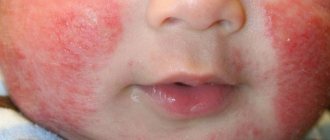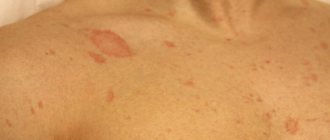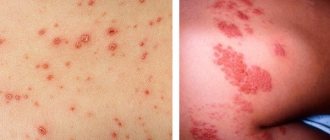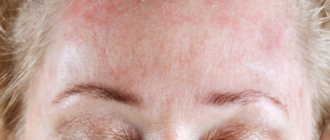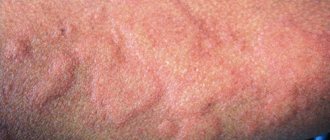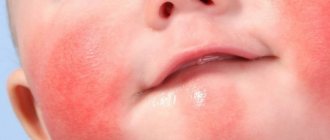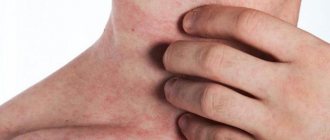Symptoms of diathesis
To identify the disease, it is worth knowing the symptoms of diathesis. Classic clinical signs are:
- atopic dermatitis;
- hyperemia - redness of the skin;
- mild skin rash, itching, dry flaky areas;
- exacerbation in the form of red spots, blisters.
Unlike children, diathesis in adults manifests itself in the form of a generalized lesion - it has a different location and shape. If in a child the disease manifests itself on the face, then in a woman or man it develops on the outer parts of the arms, palms and legs. The first symptoms may be peeling and dryness, increased sensitivity. The allergen can cause sensations of scabies, itching, and pain.
On the face
As in children, diathesis on the face of an adult is characterized by damage to the mucous membrane of the eyes, such as conjunctivitis. There is a burning sensation under the eyelids, and the affected areas swell. The patient's facial skin becomes covered with dark red and cherry-colored spots and is overgrown with a crust. Diathesis occurs in adults on the face due to allergies, so the first redness is observed 10-20 minutes after the allergen enters the body.
The disease that first appears in an adult proceeds quickly and goes away on its own, without arousing the patient’s suspicion. The rashes are pale and disappear without a trace. If contact with the allergen is constant, then the disease can develop into a chronic protracted disease. This is manifested by the presence of a strong unbearable burning sensation of the skin, a slow rate of recovery of the affected areas, increased dryness, and a complication of treatment.
On hands
More common symptoms of the disease are lesions on the skin of patients' hands. These include dryness, peeling (xerosis) of certain areas of the skin, itching, and rash. The latter manifests itself in the form of urticaria, blisters with exudate, pink-red papules, large spots similar to lichen. Diathesis on the hands of an adult is sometimes accompanied by chills, headache, unpleasant painful sensations in the abdomen, joints, and nausea.
Types of diathesis
Doctors distinguish the following types of diathesis that manifest themselves in adulthood:
- Allergic is the most common diathesis in adults (it can account for up to 90% of cases), it manifests itself due to allergies, and therefore is not always considered an independent disease. Diagnosis and treatment are carried out as if getting rid of an allergic symptom. If the type becomes chronic, it threatens to develop into rhinitis, bronchitis, and asthma.
- Uric acid – otherwise called neuro-arthritic. It manifests itself due to the accumulation of stones, the cause is a tendency to disrupt the metabolism of uric acid.
- Lymphatic-hypoplastic – with a tendency to infection of the mucous membranes and skin.
- Gastrointestinal – characterized by the development of dysbiosis.
- Hemorrhagic - appears due to a tendency to bleeding, increased sensitivity of the skin to mechanical stress.
Prevention of diathesis
Preventing a disease is always easier than eliminating the consequences. If you follow the preventive measures recommended by experts, you can prevent the occurrence and exacerbation of the disease:
First of all, you need to lead a healthy lifestyle and eliminate bad habits.- Review your diet, exclude foods that can trigger the disease (fried foods, fatty meats, smoked, salted foods, minimize the consumption of flour products).
- Try to avoid stressful situations.
- From time to time, cleanse the body of waste and toxins.
- If you have a tendency to allergies, then you should get rid of all allergens in the house, carry out wet cleaning more often, and exclude foods from the menu that can cause illness.
- Monitor the immune system, which is primarily responsible for the body as a whole.
Allergies in adults are diagnosed quite often. But if you follow all the recommendations and consult a doctor in a timely manner, you can forget about the disease.
Causes of diathesis
Stress, nervous overload - these are the main causes of diathesis in an adult. Overexertion and fatigue lead to rashes and itchy skin. Other common factors in the occurrence of pathology are:
- food allergy to haptens in sweets, fluoride in toothpastes;
- a cold allergic reaction occurs;
- cholinergic allergy – sweating due to stress, being in a hot room, swimming, physical activity;
- genetic predisposition;
- the effects of malnutrition;
- chronic diseases.
In pregnant women
Doctors are faced with the fact that diathesis manifests itself in pregnant women. Its main types, according to the approved classification, are uric acid, allergic and hemorrhagic. The causes include blood clotting pathologies, allergies, and metabolic disorders of oxalic acid salts and calcium phosphates. Diathesis during pregnancy is treated by maintaining proper nutrition, water-salt balance, and eliminating contact with the allergen. It is important to get rid of the disease before the baby is born, otherwise it will be passed on to him.
How to treat diathesis
An allergist will help you figure out how to treat diathesis. He will determine the cause of the symptoms and prescribe treatment, which must be followed exactly:
- Symptomatic – elimination of signs with antihistamines. These include ointments, corticosteroids, and immunosuppressants.
- Elimination - gradual prevention of contact with the allergen; doctors can use antigens.
- Taking medications, treatment with traditional methods.
- Changing your diet.
It is best to treat adult diathesis in a comprehensive manner. The doctor will prescribe an effective diet and prescribe dietary supplements to stimulate metabolism and strengthen the immune system. Prevention of the occurrence of disease in an adult will be the elimination of pathologies of the digestive tract and intestinal dysbiosis. The basis for maintaining health will be the transition to proper nutrition without eating processed foods and fast food.
- Facial skin care at home. How to do it right
- Korean cucumbers for the winter
- Tomato diet for weight loss
If an illness in an adult is caused by a psychological disorder, qualified assistance from a psychiatrist or independent bringing the emotional state back to normal will help. You can do yoga, get positive emotions from communicating with animals, take sedatives or herbal infusions. A long vacation for an adult will help cure an unpleasant disease.
Ointment
Anti-diathesis ointment will help eliminate the external manifestation of symptoms in an adult. Preparations in the form of creams and gels relieve itching, promote skin healing and peeling. The most popular means are:
- Protopic, Elidel - you need to use them twice a day until the rash goes away;
- Fenistil, Akriderm - reduce mild and severe itching, are antihistamines, contain corticosteroids;
- Diprosalic - salicylic acid in the composition improves skin condition;
- Along with ointments, you can take Zyrtec, Zodak or Cetrin tablets orally - one at night (this applies to everyone except pregnant and lactating women - they are prohibited from giving medications).
Folk remedies
In addition to medications, it is possible to treat diathesis in adults with folk remedies, which receives positive reviews:
- ointment with fir oil;
- ointment with spruce resin - provides relief from itching;
- sea buckthorn mixed with brilliant green, baby cream, for wiping inflamed areas;
- bearberry infusion for lotions;
- bath with string or walnut leaves - infuse the herb and take every day;
- a decoction of elecampane, gentian and yarrow for oral administration drop by drop;
- Black radish juice, a spoon three times a day.
If an adult body exhibits symptoms of diathesis due to excessive slagging, it is worth drinking 5-6 tablets of activated carbon for a couple of days. Before using a traditional recipe, consult your doctor to eliminate the risk of side effects and not to increase the damaging factors. Any herb can give an allergy and provoke illness in an adult, so you should turn to these methods only in extreme cases.
Cosmetics "La-Cri" and its help in combating the symptoms of diathesis
How to treat diathesis? Pharmacy cosmetics "La-Cri" help relieve allergy symptoms on the skin - the consequences of allergic diathesis in adults. The cream relieves itching and redness, fights flaking, and promotes skin restoration. The cleansing gel gently removes impurities from affected areas, soothing the skin.
The basis of La-Cri cosmetics are the active ingredients of licorice, string, walnut and avocado oils, bisabolol and panthenol. All products are hypoallergenic and do not contain aggressive chemical additives, hormones, dyes or flavors. La-Cri cosmetics are suitable for pregnant women and people with sensitive skin.
Diet
A diet for diathesis in adults that excludes foods that provoke the body to allergies will help to achieve a cure for irritating factors. The minimum duration of such a diet will be six months, so that the blood is completely cleared of irritants and the immune system is restored. Here are some rules for following nutrition when an adult is sick:
- exclusion of confectionery products, citrus fruits, red and orange vegetables and fruits;
- ban on strawberries, currants, wild strawberries;
- exclusion of sausages, spices, smoked meats, mayonnaise (spicy foods and seasonings should also be avoided);
- inclusion of water-based porridges, green vegetables and fruits, and dietary meat in the menu;
- variety of adult nutrition with white vegetables and fruits, low-fat fermented milk products.
Diathesis in adults: causes of occurrence
The manifestation is most often caused by certain problems in the functioning of the immune system.
This state of the body is formed at the genetic level. Often, predisposition to diseases is determined by heredity. The child’s health is also influenced by the mother’s condition during pregnancy and his lifestyle in the first years after birth. Allergic diathesis in adults often causes atopic dermatitis. This is a chronic inflammatory skin disease of an allergic nature. Its occurrence is influenced by genetic predisposition and skin sensitization to allergens. Patients with atopic dermatitis are characterized by sensitivity to a wide range of allergens:
- food (diathesis from sweets is especially common in adults);
- medicinal;
- pollen;
- chemical
If you maintain a healthy lifestyle, maintain your immune system and avoid contact with pathogens, diathesis may be invisible.

